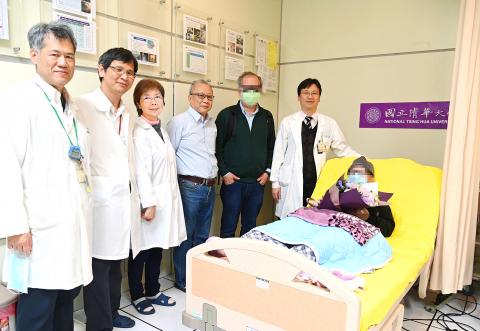More than 120 people with brain or head and neck cancer have been treated with a boron neutron capture therapy developed by National Tsing Hua University, a team of researchers said yesterday.
The nation’s only research nuclear reactor was owned by the university, which converted it into a device for clinical therapy and established the Boron Neutron Capture Therapy Center.
The conversion was not directly related to the nation’s change in nuclear power policy, center director Lee Min (李敏) said, adding that the university’s College of Nuclear Science had been exploring more applications for radiation.

Photo courtesy of National Tsing Hua University via CNA
In the 1990s, the college sent personnel to learn the therapeutic technique at the Massachusetts Institute of Technology, where the first clinical trials were conducted, he said, adding that only Taiwan and Japan have continued to develop and use it in clinical applications.
In the therapy, drugs containing boron — a nonmetal element used in nuclear reaction — are injected in cancer patients and accumulate in tumors, which are then irradiated by a neutron beam generated by the reactor, Institute of Nuclear Engineering and Science professor Chou Fong-in (周鳳英) said.
High-energy particles produced through nuclear reactions kill tumor cells without affecting normal cells, making the therapy suitable for combating tumors that are widespread and harder to surgically remove, she said.
After the cancer cells absorb the drugs, the high-energy radiation “ignites” the drugs, which function like “explosives,” annihilating the malignant cells, Taipei Veterans General Hospital oncologist Chen Yi-wei (陳一瑋) said.
Through a connection between the center and the International Society for Neutron Capture Therapy, a Spanish woman in October last year arrived in Taiwan for treatment of a malignant tumor in her brain stem, the team said, withholding the woman’s name to protect her privacy.
After receiving an examination at the hospital, the woman last month visited the center to receive the therapy, which reduced her tumor from 3.51cm to 1.06cm, it said.
As her second radiation session was scheduled for Feb. 14, the team helped the woman mark Valentine’s Day, with her husband — who is a physician — preparing a bouquet to celebrate her recovery, it added.
The woman has returned to Spain for follow-up observation, Lee said.
As it is a relatively new therapy, cancer patients can only receive it after careful evaluations by doctors and personnel from the center, and as well as with case-by-case approval from the Food and Drug Administration, he said.
Since the center started working with physicians at the hospital in 2010, more than 120 patients have received the therapy, he added.
The university is also working with the Taoyuan City Government on a planned affiliated hospital at the Taoyuan Aerotropolis, Lee said, adding that he hopes the therapy would benefit more patients.

The Grand Hotel Taipei on Saturday confirmed that its information system had been illegally accessed and expressed its deepest apologies for the concern it has caused its customers, adding that the issue is being investigated by the Ministry of Justice Investigation Bureau. The hotel said that on Tuesday last week, it had discovered an external illegal intrusion into its information system. An initial digital forensic investigation confirmed that parts of the system had been accessed, it said, adding that the possibility that some customer data were stolen and leaked could not be ruled out. The actual scope and content of the affected data

DO THEY BITE IT? Cats have better memories than people might think, but their motivation is based entirely around the chance of getting fed Cats can remember the identity of the people who fed them the day before, Taipei-based veterinarians said on Friday, debunking a popular myth that cats have a short memory. If a stray does not recognize the person who fed them the previous day, it is likely because they are not carrying food and the cat has no reason to recognize them, said Wu Chou Animal Hospital head Chen Chen-huan (陳震寰). “When cats come to a human bearing food, it is coming for the food, not the person,” he said. “The food is the key.” Since the cat’s attention is on the food, it

‘LIKE-MINDED PARTNER’: Tako van Popta said it would be inappropriate to delay signing the deal with Taiwan because of China, adding he would promote the issue Canadian senators have stressed Taiwan’s importance for international trade and expressed enthusiasm for ensuring the Taiwan-Canada trade cooperation framework agreement is implemented this year. Representative to Canada Harry Tseng (曾厚仁) in an interview with the Central News Agency (CNA) said he was increasingly uneasy about Ottawa’s delays in signing the agreement, especially as Ottawa has warmed toward Beijing. There are “no negotiations left. Not only [is it] initialed, we have three versions of the text ready: English, French and Mandarin,” Tseng said. “That tells you how close we are to the final signature.” Tseng said that he hoped Canadian Prime Minister Mark Carney

President William Lai (賴清德) yesterday bestowed one of Taiwan’s highest honors on Saint Vincent and the Grenadines (SVG) Ambassador Andrea Clare Bowman in recognition of her contributions to bilateral ties. “By conferring the Order of Brilliant Star with Grand Cordon on Ambassador Bowman today, I want to sincerely thank her, on behalf of the Taiwanese people, for her outstanding contribution to deepening diplomatic ties between Taiwan and SVG,” Lai said at a ceremony held at the Presidential Office in Taipei. He noted that Bowman became SVG’s first ambassador to Taiwan in 2019 and